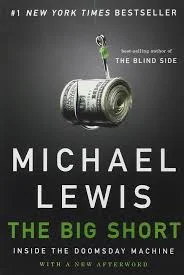Recommended Reading: The Big Short
Just a quick post today to share a recommendation on The Big Short, Inside the Doomsday Machine by Michael Lewis. The book describes the insanity of the subprime mortgage crisis from the perspective of those that discovered it early and bet against it; the short sellers. It describes how they came to the realization that something was very wrong, how they worked to uncover it, how they, over time, wagered huge sums on their belief and how nobody listened to them until it was too late.
Lewis looks at the large institutional firms (the ones we bailed out) and reveals an ugly side with all the wrong incentives. It is a world few of us know or comprehend - and obviously not because we lack the capacity, but simply because it is a world so divorced from reality.
This video of Lewis on the Daily Show gives a good overview of the book. At the end of the interview, Stewart starts to discuss the popular belief (which he apparently shares) that we should not allow short selling, which is essentially betting that a security will decline in value. As Lewis points out, but does not have a chance to elaborate on, short selling is the only incentive there is to bring bad news to the market. Without short selling, Goldman Sacs and AIG may still be bundling BBB-rated mortgages together, magically transforming them into (toxic) AAA-rated mortgages, with everyone in the system getting rich and the economy getting further and further out of balance. Short sellers are the "heroes" in this book, although you see the toll this entire thing takes on them too.
- The Daily Show With Jon Stewart Mon - Thurs 11p / 10c
- Michael Lewis
- www.thedailyshow.com
- Daily Show Full EpisodesPolitical HumorTea Party
One short note: in the epilogue Lewis makes an argument that the markets are not efficient, or that we should not delude ourselves into thinking that the markets are efficient. This counters a common belief that open markets set prices efficiently, the aggregate wisdom of the many correctly calculating risk and reward. It is difficult to finish this book and disagree with him. Only a handful understood the risk inherent with repackaged subprime loans, and the market priced that risk incorrectly for years. All the big players were happy to remain ignorant too as they were getting quite rich on the transactions.
I'll just point out the obvious, however, and that is that the market ultimately is efficient. Today those repackaged subprime securities and the various financial instruments that they spawned are priced correctly: they are worthless. The lesson I take from the book is not that Wall Street firms are corrupt (they may be) or that they are greedy and misguided (undoubtedly), but that the system needs more incentive to find that correct price more quickly. We should not quash short-selling. We should instead quash (or allow to fail) those too-big-to-fail firms that had more near-term incentive to be ignorant and hope things worked out than they had long-term incentive to get it right.

